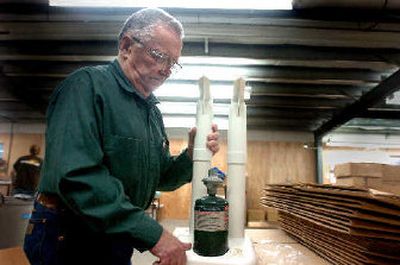The market is ripe

ST. MARIES, Idaho – Peet’s Shoe Dryers has pulled the picture of a hunter from its packaging.
Through the magic of Photoshop, the rugged-looking man now carries global positioning equipment instead of a rifle. The color of his coat has also changed, from hunter orange to verdant green.
The subtle shift reflects the company’s quest for new customers.
Since 1968, Peet’s Shoe Dryers have enjoyed cult-like status among the Inland Northwest’s loggers, hunters and farmers. Long-time customers swear by the product’s overnight ability to dry out the soggiest pair of work boots.
But the St. Maries company also sees a future in hiking boots, hockey skates, running shoes and family footwear.
As a result, new packaging styles are softer. The hunter was appropriate for certain audiences, but “almost alienated us from the white collar, suburban, anti-gun market,” said Rick Meier, Peet’s director of sales and marketing. Some boxes now feature pictures of women confronting stinky piles shoes in the laundry room.
Half of the company’s sales growth is coming from a demographic that Meier refers to as “soccer moms, hockey moms and football moms.”
“More walks of life are starting to know about us…but shoe dryers are a funny thing,” he said. “Once they get them, people love them. But they’ve lived their whole life without them, and they have to be willing to spend 35 to 40 bucks on an impulse buy.”
The company also touts the dryers’ health benefits.
At Mead High School, 15 distance runners will receive complimentary dryers this year from Peet’s. Meier is asking runners to keep journals tracking dryer use and how their feet feel.
“There’s nothing worse than wet shoes,” said Pat Tyson, Mead’s distance coach, who has used Peet’s dryers in the past.
Many of his athletes train through winter rains and slush. Damp shoes tend to contribute to athlete’s foot and other problems, Tyson said.
Peet’s has added Road Runner Sports to its lineup of advertisers, which include well-known sportmen’s catalogs Cabela’s and Bass Pro. The company is also working to gain endorsements from diabetics, since open foot wounds are a major cause of amputation in people with diabetes, Meier said.
By broadening Peet’s customer base, Meier hopes to spread sales more evenly throughout the year. About 70 percent of Peet’s sales take place between September and December.
Adapting marketing strategies are the latest evolution at Peet’s. The firm began in the Arizona desert during the 1960s, when founder and company president Gene Peet worked as an electrical engineer for the Martin Co. He was part of a crew building nuclear warheads, and the hot climate made his feet so sweaty that his Red Wing work boots never dried out.
Peet tinkered with different types of dryers, eventually settling on a thermal convection process. Warm air rises naturally through two plastic shoe trees and circulates throughout the shoes. Moist air is vented out. Several years ago, the company added propane-fueled dryers to its lineup, so people could take them camping and hunting.
After he received a patent, Peet moved back to his hometown of St. Maries. His first customers were loggers and chainsaw shops. White’s Boots, a Spokane firm that makes hand-crafted leather boots, is one of Peet’s longest-standing vendors.
“We sure believe in the product. We think it makes the boots last longer,” said Gary March, White’s Boots president.
The boots dry so slowly that the leather doesn’t get brittle, March said. The dryers also keep people from doing stupid things – like putting a $300 pair of boots into the oven, he said.
Peet’s dryers are found in a third of NFL locker rooms, according to Meier. This fall, the company shipped a batch of propane dryers to a squadron in Iraq at the request of a soldier from Twin Falls, Idaho.
Ten years ago, Peet’s sales were concentrated in Idaho, Washington, Montana, Oregon and Alaska. Now, about 70 percent of the company’s revenue come from sales east of the Mississippi – primarily the Northeast and upper Midwest.
Meier has also noticed a shift from rural to and suburban. “We move a lot of dryers in places like Madison, Janesville and Grand Rapids, Mich.,” he said.
Peet’s remains modest in size, with less than $5 million in sales and about 33 full-time employees. The company still has plenty of room to grow throughout various markets, Meier said. During its lifetime, Peet’s has sold about 2.5 million dryers.
“We haven’t sold enough to sell one to every hunter in Michigan, Ohio and Pennsylvania,” which have a combined hunter population of around 3 million, he said.